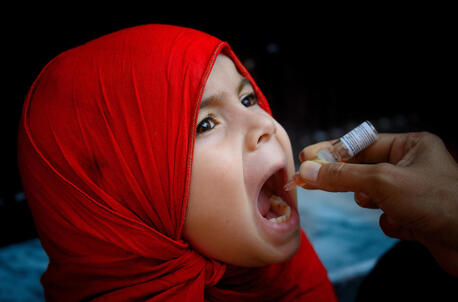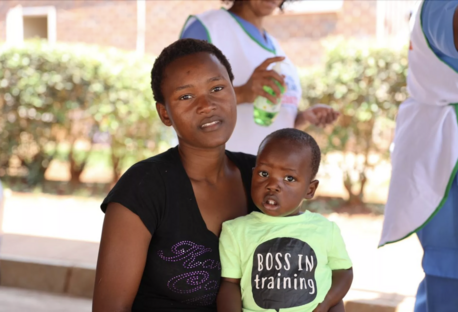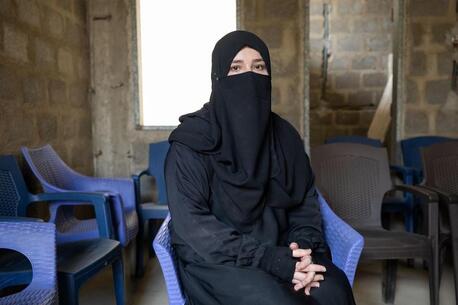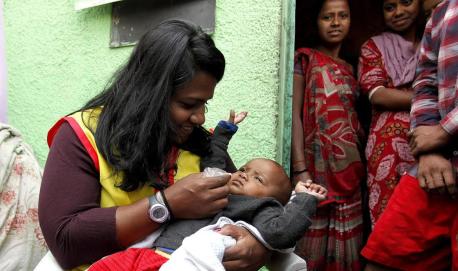
Americans Who Never Forget: Life Without Vaccines
Today, relatively few Americans grasp the seriousness of polio, measles and tetanus, thanks to the success of routine immunization. But those whose lives have been touched by these diseases can never forget how damaging they can be — and how important it is to keep vaccinating.
It was late February, 1960 when measles crash-landed into Emmi Herman's childhood, putting her 9-year-old sister Marcie into a coma and destroying her chances at a full life.
Marcie's measles turned into measles encephalitis — a dangerous swelling of the brain — a complication that occurs in roughly 1 in 1,000 cases. The condition left her with a permanent brain injury and long-term physical and emotional difficulties.
"My sister lived a full life — she was so talented, playing the piano, making art — but she was childlike in many ways, and could not live independently," Herman, a children's book author from Searingtown, NY, told UNICEF USA. "I often wonder what our lives would have been like had she been able to get the vaccine."
Marcie died in August 2020 at age 70, after suffering a stroke. "She was so looking forward to being one of the first to get the COVID vaccine," Herman says.
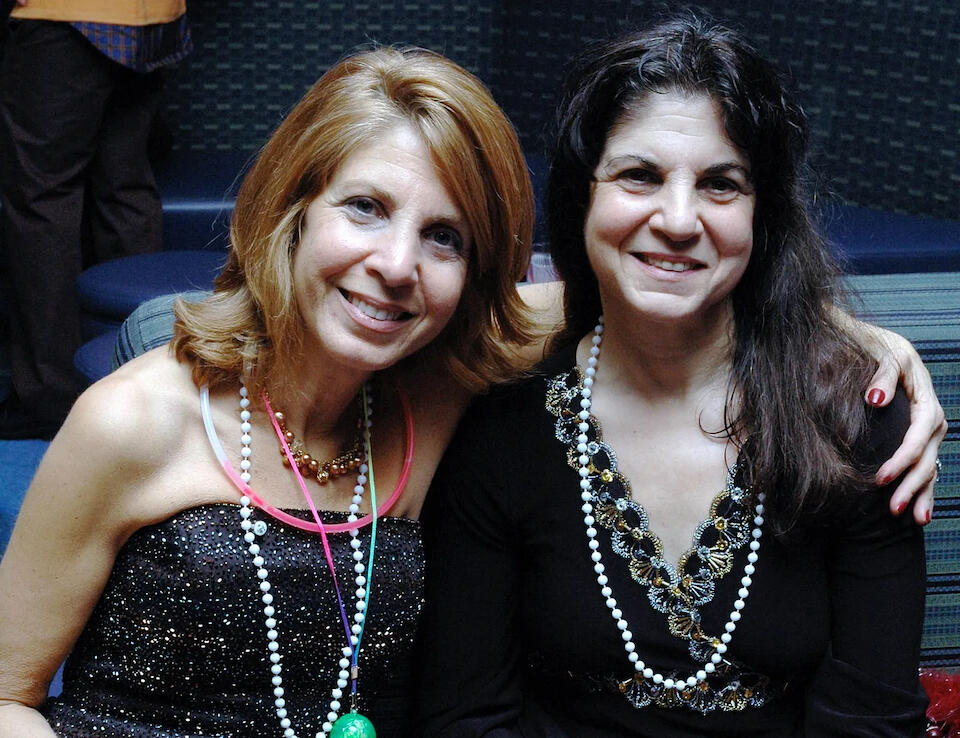
Before the vaccine, nearly all children contracted measles
Most of America seems to have largely forgotten just how serious measles can be — that it's more than a rash, and can cause permanent hearing loss and even death from pneumonia. The reason they've forgotten: routine immunization.
Before the measles vaccine was introduced in 1963, nearly all children got measles by the time they were 15; tens of thousands of patients ended up hospitalized and more than 400 died every year in the U.S.
Four decades later, annual cases had dwindled to a few dozen. But then measles made a startling comeback — with vaccine hesitancy as a major culprit.
Measles makes a comeback amid vaccine hesitancy
It was after reading about a 2014 measles outbreak in California that Herman decided to become a vaccine advocate.
"I learned that the reason it spread so fast was that immunization levels in the area had dropped, because parents were opting out," she recalls. "I thought I might be able to get through to those who are on the fence about vaccinating their children, and help convince them how important it is." Herman often writes about the topic and is a longtime volunteer member of Voices for Vaccines.
In 2019, measles made an even bigger comeback, with 1,274 people infected in 31 states, over two-thirds of them children. The CDC concluded that a number of people had caught it while traveling abroad and brought it back home; measles remained common in many parts of the world, including countries in Africa, Europe, Asia and the Pacific.
But another reason for the upswing: the ease with which the disease can spread within communities where there are pockets of unvaccinated people. The majority of people who fall ill with measles are unvaccinated.
Over the next four years, cases in the U.S. would drop back down, landing between a low of 13 in 2020 and a high of 121 in 2022, as routine vaccinations were disrupted due to the COVID-19 pandemic.
Now measles is trending upward in the U.S. yet again — as of April 5, 2024, there were 113 cases reported in 18 states since the beginning of the year, nearly double the number reported in all of 2023 — with experts continuing to cite vaccine hesitancy as a contributing factor.
"My sister got sick before there was a vaccine," Herman says. "Now that there is one, no child or family should have to endure the lifelong hardships that we have."
My sister got sick before there was a vaccine. Now that there is one, no child ... should have to endure the lifelong hardships.
From polio survivor to vaccine advocate
Polio, part of every parent's nightmare more than a half century ago, has been similarly vanquished stateside; the last case of wild poliovirus in the U.S. was in 1979.
But polio is not a distant memory for Minda Dentler. Born in India in 1978, before polio immunizations were widely available there, Dentler contracted the disease as an infant and her legs became permanently paralyzed. Adopted from an orphanage by an American family and raised in Spokane, WA, she remembers having to sit out while her siblings played sports.
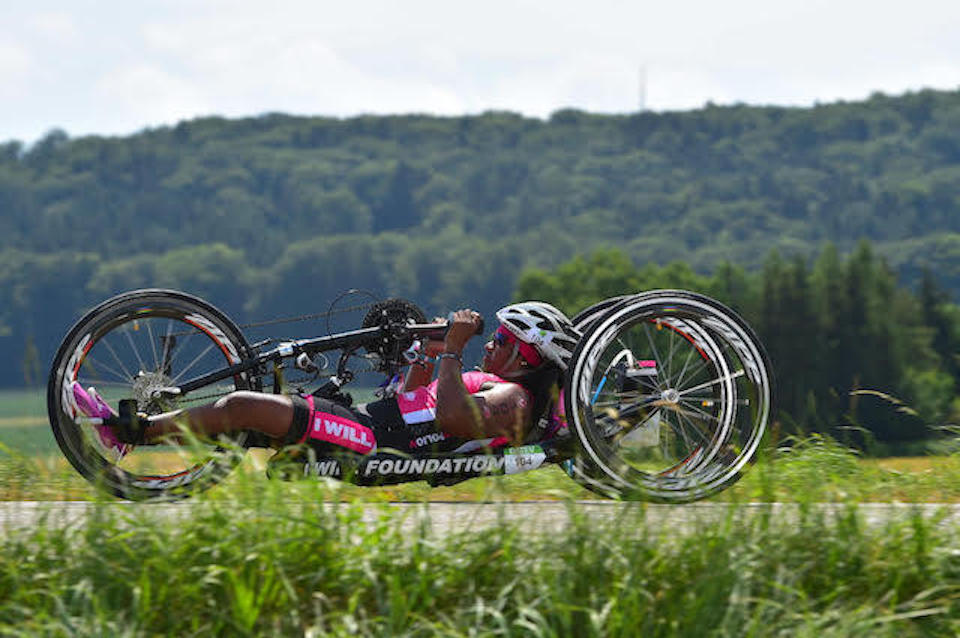
Dentler didn't sit out for long. As a young adult, she began training and in 2013, she became the first female wheelchair athlete to complete the Ironman championship course. She has since completed three more Ironman triathlons, plus a half Ironman triathlon on six continents. Married with a 9-year-old daughter, Dentler works full-time in the financial services industry. In March, she published an autobiographical children's book, The Girl Who Figured It Out.
"The day my daughter got her first polio vaccine, it hit me how completely different her life will be from mine," Dentler told UNICEF USA. "Watching her running, hopping, kicking — doing all the things I can't do — only reinforces for me the need to keep vaccinating, to keep going until polio is gone for good."
The day my daughter got her first polio vaccine, it hit me how completely different her life will be from mine.
As an ambassador for Rotary International, a UNICEF partner and leader in the global polio eradication effort, Dentler traveled to India with other Rotarians in 2015 to participate in a national immunization campaign. (India eliminated polio within its borders in 2014; only two endemic countries remain: Afghanistan and Pakistan.)
Teaming up with local health workers in poor communities near Kolkata and Delhi, and administering polio drops to some of the children, "felt like I was coming full circle," Dentler says. "I can't change what happened to me, but I can help make sure other children are spared. No one should have to live with the effects of polio when it's completely vaccine-preventable."
I can't change what happened to me, but I can help make sure other children are spared.
While in India, Dentler was struck by the fact that many parents had to walk for miles and wait hours to get their kids vaccinated. In the U.S., she says, "my generation seems to take vaccine access for granted."
A child's life touched by tetanus
Neonatal tetanus is another disease that has been effectively wiped out in the United States. Most people think of a tetanus shot as something you need when you step on a rusty nail, not a critical step in prenatal care. Caused by unsanitary conditions during childbirth, tetanus is almost always fatal in newborns and still kills tens of thousands of babies every year, globally.
Carrie Rhodes-Nigam will never forget how her daughter nearly died from tetanus. Rhodes-Nigam was working at a children's hospital in China in 1997 when she met a 2-month-old baby girl who had had tetanus but was treated and, against all odds, survived. The nurses told her that the baby's parents had brought her in, but had left when she was still convulsing, probably believing she would not make it.
When I think of the nightmare those poor parents endured, how helpless they must have felt ... I ache.
"When I think of the nightmare those poor parents endured, how helpless they must have felt ... I ache," Rhodes-Nigam wrote in a moving account of how she came to adopt the baby. She named her Dani and brought her home to Seattle, where she grew up healthy and strong.
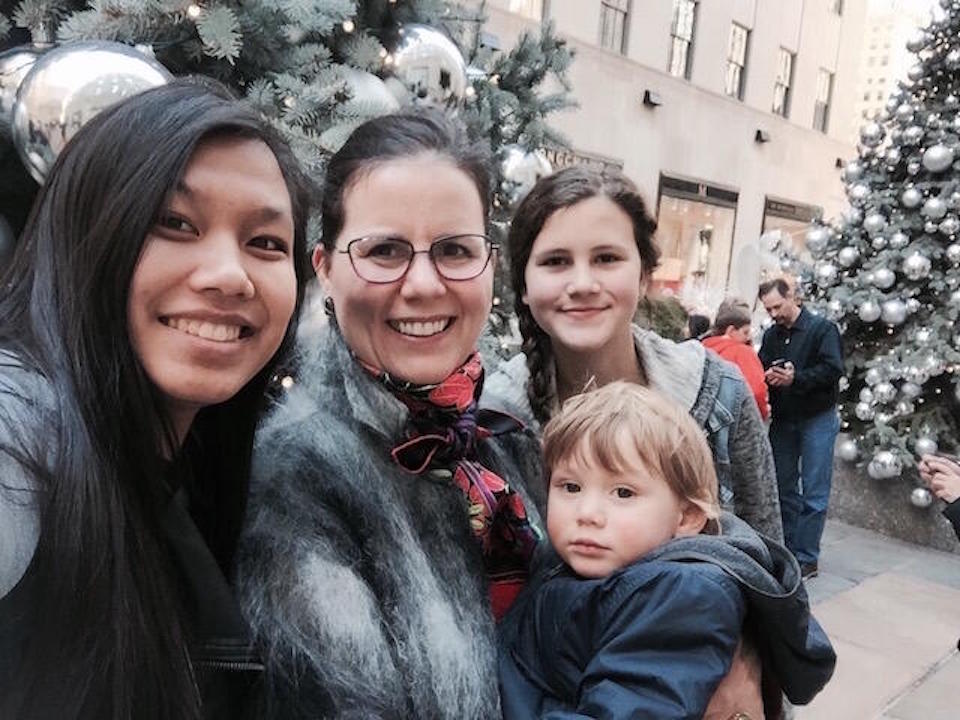
Rhodes, a UNICEF USA Northwest regional board member, is a longtime supporter of Kiwanis International and the UNICEF-supported global partnership to end maternal and neonatal tetanus (MNT) worldwide.
Thanks to worldwide immunization efforts targeting women of reproductive age – just three doses of an inexpensive vaccine protects a mother and her future babies for the majority of her childbearing years – the number of newborn deaths from tetanus declined by 88 percent between 2000 and 2018 (the most recent year for which estimates are available). And since 1999, 47 out of 59 at-risk countries have successfully eliminated MNT.
"I get excited when I hear that another country has eliminated MNT," Rhodes-Nigam told UNICEF USA. "It's gratifying to see that we're that much closer and that fewer mothers and children will suffer. I am surprised when people here in the U.S. don't vaccinate their children when they have the option to. I can't believe that we even need to say it — that vaccines are important and save lives."
Immunization's worldwide impact
UNICEF works with partners to bring immunization to children around the world, and to make sure that children everywhere, not just in the U.S., can benefit. These efforts have helped reduce child mortality by 60 percent since 1990, saving an estimated 2 million to 3 million lives every year.
There are other gains as well: every dollar invested in immunization yields close to $20 in annual health savings, according to one analysis that looked at the return on investment from immunization against 10 pathogens in 94 low- and middle-income countries.
But to sustain these gains, full coverage, known as herd immunity — defined as a vaccination coverage rate of 95 percent or above — must be maintained.
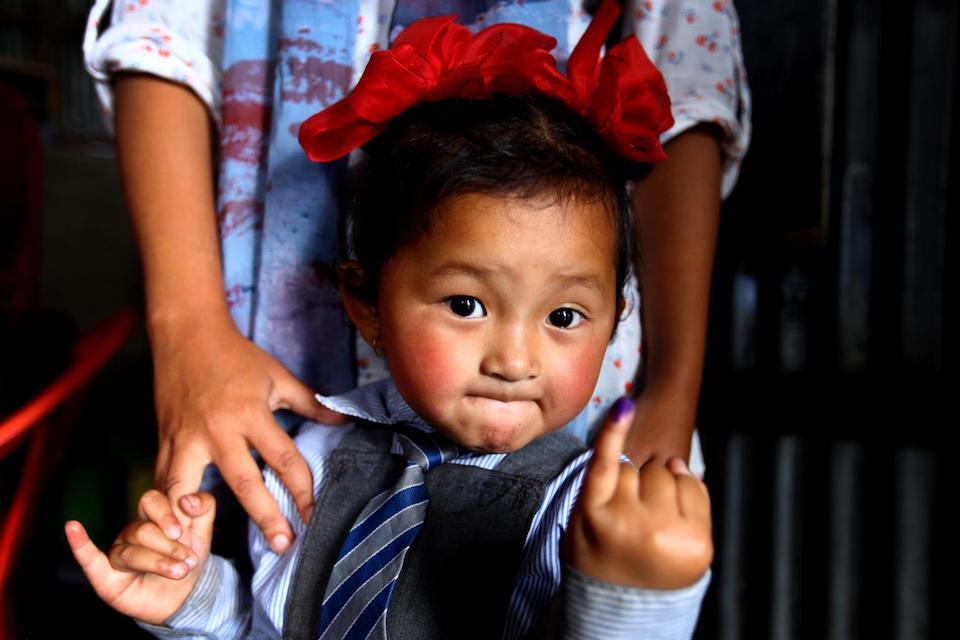
Through advocacy, education and fundraising, UNICEF USA helps increase the impact of UNICEF's global efforts to ensure children are protected against vaccine-preventable diseases. Your tax-deductible contribution can help make a difference. Donate today.
